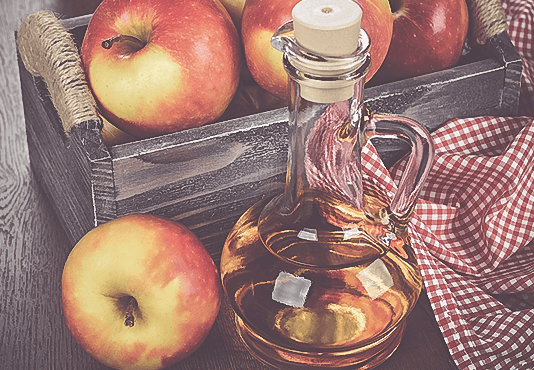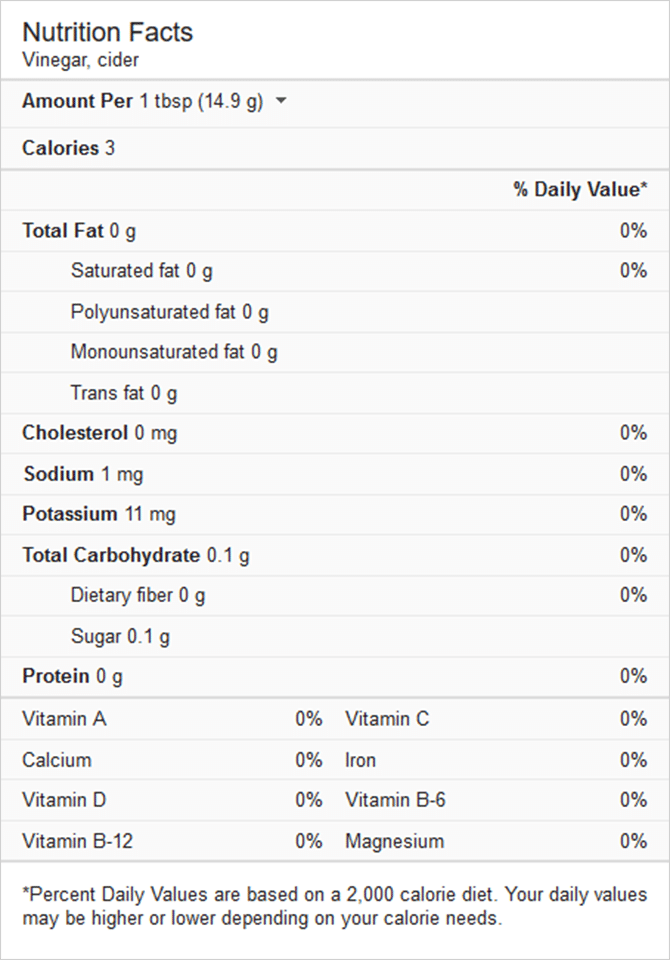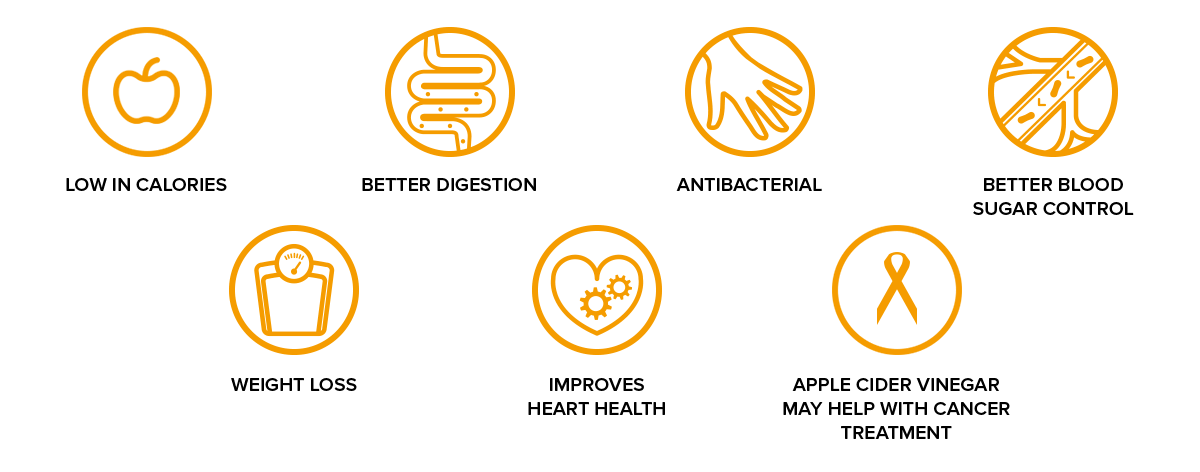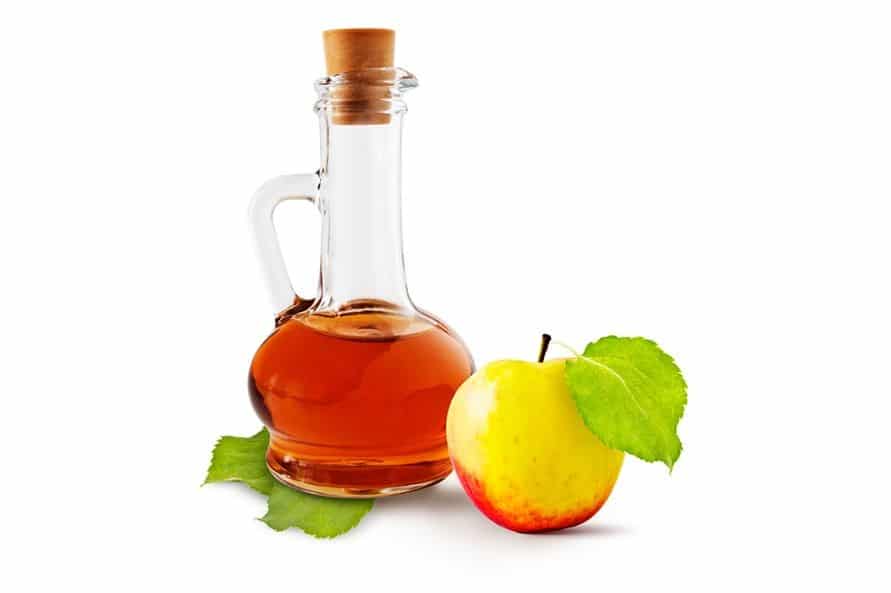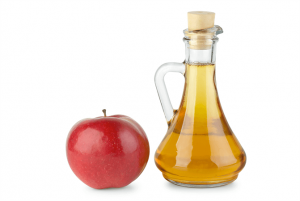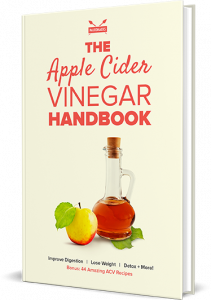
APPLE CIDER VINEGAR
THE ULTIMATE GUIDE
People have used apple cider vinegar (ACV) for thousands of years. Everyone from the ancient Babylonians to the Greeks used it as a cure-all for all kinds of health ailments.
Like coconut oil and grass-fed butter, ACV is enjoying a comeback among people who care about their health.
No matter where you look, you’ll find someone making wild claims about what ACV can do for your health, beauty, and home. Some claims are anecdotal, and they haven’t been supported by scientific research… yet. But many other claims have been scientifically tested and proven.
If you want to know how ACV can help you, keep reading.

ACV is a bitter, acidic liquid made from (you guessed it) apples!
It’s a two-step process: First, manufacturers expose crushed apples to yeast. The yeast eats the sugars, which turns them into alcohol (in a process called fermentation).
Next, manufacturers add acid-forming bacteria (i.e., acetobacter), which ferments the alcohol further. Then it turns it into a liquid called “acetic acid”—the main compound in ACV. This bacteria converts the alcohol into vinegar. Acetic acid and malic acid give apple cider vinegar its sour taste.
Apple Cider Vinegar Nutrition Facts
ACV only contains a few calories, but it packs a huge nutritional punch. ACV doesn’t contain many vitamins or minerals, though it does contain trace amounts of iron and potassium.
High-quality apple cider vinegar (which is organic, unpasteurized, and unfiltered) also contains strands of proteins, enzymes, and beneficial bacteria (e.g., probiotics). These ingredients are found in a cobweb-like substance called “the mother.” The mother is 100% edible; it usually floats at the bottom of ACV bottles.
Most nutritional benefits come from the acetic acid itself, as well as the enzymes and other nutrients found in unpasteurized ACV.

Definitely!
It packs a strong taste, but its effects on the body are incredibly mild. It’s extremely safe—if you limit your consumption to just a few tablespoons a day. That works out well, because that’s all you need to reap the awesome benefits.
Bottom Line:
Apple cider vinegar is a bitter, acidic liquid made by fermenting apples with yeast and bacteria.
ACV is extremely low in calories, but it packs a big nutritional punch.
People have used ACV for thousands of years, as a cure-all for various health issues.

Apple cider vinegar offers a host of benefits, which go way beyond better health. Here are just a few:
Low in Calories
You get a lot of flavor in just a tiny amount of apple cider vinegar. So it’s easy to watch your calories, because one tablespoon of the stuff only sets you back three calories (1).
The combination of intense flavor and minimal calories make ACV the perfect choice to flavor your foods—especially if you’re trying to lose weight.
Apple cider vinegar is great for homemade marinades, drinks, chutneys, and salad dressings. Instead of loading up with a high-calorie option like mayo or ranch, you can choose ACV to skip the calories—without skimping on flavor.
Better Digestion
Heartburn, acid reflux, and other digestion problems are some of the most common health issues today. Millions of people suffer every time they have a meal. Many of them end up relying on potentially dangerous pharmaceutical drugs.
You shouldn’t have to worry about your digestion!
Apple cider vinegar can help.
Some of the most common digestion issues don’t stem from having too much stomach acid—but too little to break down foods properly. Ingesting apple cider vinegar can give your digestive system the extra acid it needs to work—without causing any problems.
An ingredient called “apple pectin fiber” is found in “the mother” of raw and unfiltered apple cider vinegar. It eases the entire gastrointestinal tract, which helps take care of bloating, gas, and stomach cramps.
You can even use ACV as a mild laxative when you’re struggling with constipation. And don’t worry if your bowel movements are already regular. Adding ACV shouldn’t cause any issues.
As if all of that weren’t enough, acetic acid also helps you absorb the minerals in your food, so you can get the most nutritional bang for your buck (2).
Antibacterial
People have used apple cider vinegar to clean and disinfect for thousands of years. It was actually one of the favorite methods of Hippocrates (the father of modern medicine) to treat wounds, sores, and ulcers (3).
Acetic acid kills contaminants, and prevents them from multiplying or reaching harmful levels. Apple cider vinegar can kill bacteria, viruses, and fungi (4).
But the benefits don’t stop there. ACV can also keep bacteria from growing, making it a natural food preservative. Multiple studies have found that it inhibits harmful bacteria like E. coli (5).
This finding results in a wide range of potential applications. You could use apple cider vinegar to preserve and pickle foods—or to treat athlete’s foot, nail funguses, or warts.
Better Blood Sugar Control
Apple cider vinegar’s effect on blood sugar is one of the most important (and well-researched) benefits to date. For one thing, ACV lowers blood sugar levels. That’s great for type 2 diabetics, who often struggle with chronically elevated blood sugar.
How does it work?
Scientists think the acetic acid in apple cider vinegar lowers blood sugar by preventing the complete digestion of complex carbs. This process probably delays gastric emptying—or decreases the rate at which body tissues uptake glucose (6).
ACV is also great for people who don’t have diabetes. Because elevated blood sugar is linked to premature aging and various chronic diseases, adding some ACV to your diet is a great way to keep it under control.
Numerous studies have found that ACV:
Reduces blood sugar (7)
Increases insulin sensitivity (8)
Decreases the blood sugar response during meals.
Weight Loss
One study found that ingesting apple cider vinegar with meals increased the participants’ satiety (i.e., feelings of fullness) (9). The participants who ate ACV ended up consuming fewer calories throughout the rest of the day… without even consciously trying.
Not all calories are created equal, but effortless reduction of your daily intake can add up to significant weight loss over time.
Another study of obese people found that the daily consumption of apple cider vinegar resulted in a smaller waist circumference, less belly fat, and lower blood triglycerides (10).
ACV isn’t going to turn an obese person into a thin person by itself. But combined with other things like proper diet and exercise, it does create a tangible effect, which can lead to some pretty awesome results.
Improves Heart Health
Apple cider vinegar could also decrease some of the key risk factors of heart disease (the #1 cause of death).
First, apple cider vinegar might lower cholesterol and triglyceride levels. Multiple studies of rats confirmed the link between ACV consumption and improved heart health (11).
Apple cider vinegar also contains an antioxidant called “chlorogenic acid.” The theory: This acid keeps LDL cholesterol from becoming oxidized, which is key because it’s oxidized LDL (not LDL itself) that acts as a driver for an eventual diagnosis of heart disease (12).
A lot more research needs to be done to specifically explore the connection between apple cider vinegar and heart disease in humans. However, one observational study found that women who used apple cider vinegar in their salad dressings reduced their risk of heart disease (13).
Apple Cider Vinegar May Help with Cancer Treatment
Apple cider vinegar’s supposed anti-cancer properties have gotten a lot of health-conscious people excited. Multiple studies have found that apple cider vinegar may shrink tumors and kill cancer cells in rats (14).
Yet there are other issues to consider. These studies often use rice vinegar, instead of ACV. Also, researchers do these studies in test tubes (on isolated cancer cells, usually in rats). So the impact might not be as significant (or exist at all) in human beings.
It’s possible that ACV could help with cancer treatment, but we need a lot more research before we can firmly make that conclusion.
Bottom Line:
Using apple cider vinegar allows you to reap numerous benefits, ranging from weight loss and improved digestion to improved blood-sugar control and better heart health.

So how are you supposed to use ACV? Do you pour it on your food? Drink it straight from the bottle?
In the kitchen, you can use apple cider vinegar in:
Chutneys
Marinades
Natural food preservation
Salad dressing (Mix it with olive oil or other types of oil to dilute the flavor.)
Smoothies
Soups (Apple cider vinegar is key for homemade bone broth. It helps leech vital minerals from the bones into the stockpot water, which is what you eventually eat.)
Vinaigrettes
Some of the tastiest ways to use apple cider vinegar are also the simplest. Some people like to drizzle it over cooked greens. It also works great in marinades, which tenderize meat before cooking.
Tip:
Heartburn and digestive issues are two of the most common health complaints today.
They’re standard symptoms of the typical Western diet, which occur because people don’t have enough stomach acid (e.g., hydrochloric acid).
However, if you add raw apple cider vinegar, you can help your stomach create enough acid to start the digestion process and kill off harmful microbes (15). If you have a history of stomach ulcers or are using PPI drugs, it’s a good idea to take things slow and get the go-ahead from your doctor.
Giving your digestion a boost is easy. Just eat more ACV-based salad dressings or drink some raw, unfiltered ACV that’s diluted with water.
Apple Cider Vinegar for Skin Care and Acne Treatment
One of the coolest things about apple cider vinegar is how it helps balance the pH of your skin. Imbalanced pH can lead to annoying skin issues, such as blemishes, age spots, clogged pores, and acne breakouts.
Most skin care products are on the alkaline side of the pH scale (16). ACV is more effective because its natural acidity is closer to the natural pH of your skin.
Want to try a homemade toner? Just dilute it: one part apple cider vinegar and two parts water. Use a cotton ball to spread it over your face, which helps clear up trouble spots. You can make a batch beforehand, store it in the fridge, and apply it whenever you’d like.
I couldn’t find any scientific studies examining apple cider vinegar and acne treatment, but there is a great deal of anecdotal evidence, which verify that it helps clear up pesky breakouts (17).
Apple Cider Vinegar for Hair Care
It might be time to throw out your old conditioner…
For your hair, apple cider vinegar is hard to beat. People use it as a natural hair-care product because its acidity is close to that of human hair.
You can use it (with water) to rinse your hair after shampooing. It adds body and shine to your hair.
How do you apply it?
Just mix ½ tablespoon of apple cider vinegar and one cup of cold water. You can always make a large batch and store it in the shower. (Old shampoo bottles work great.)
You can even use apple cider vinegar to treat dandruff. All you have to do is mix equal parts ACV and water, apply it to your scalp, and rub it in. Wear a shower cap, and leave it in your hair for a few hours; that will give the vinegar plenty of time to kill off the dandruff bacteria. Repeat this process a few times a week, and those flakes will be gone in no time!
Apple Cider Vinegar Detox
Because apple cider vinegar helps balance the body’s pH levels, it’s a popular choice in many detox drinks and programs.
In an environment filled with so many toxins (e.g., in the air, water, and conventional foods), it’s a great way to get proactive about protecting yourself.
Here’s a quick recipe for an ACV-based “detox drink,” which you can have first thing in the morning:
¼ cup water
1 T ACV
½ T raw, local honey
1 t ground cinnamon
Juice from 1 lemon
Just mix everything with a spoon, and drink it right away. I like to use warm water to help melt the honey a bit. If you want a super detox, you can always use apple cider vinegar, water, and Epsom salts to make your own detox bath.
Apple Cider Vinegar for Pets
Did you know apple cider vinegar can help your pets’ flea problems?
It’s true.
ACV helps reestablish pets’ “acid mantle” (i.e., the fine, slightly acidic film on the surface of their skin), which acts as a barrier to viruses, bacteria, and other contaminants (e.g., fleas).
Just use equal parts apple cider vinegar and water, spray it onto your pet’s fur, and rub it in. Make sure the whole coat is saturated, and let it air dry. Repeat this process for a few days, and bye bye fleas!
Bonus points: apple cider vinegar is completely safe on your pet’s fur. You don’t have to worry about them licking it off and getting sick.
Apple Cider Vinegar for Home
Believe it or not, apple cider vinegar can make an awesome natural disinfectant. So it’s a great alternative to expensive cleaning products, which are loaded with toxic chemicals (18).
Just use one part ACV and two parts water. Then you can clean:
Counter tops
Glasses
Kitchen surfaces
Microwaves
Mirrors
Oven ranges
Toilets (Just pour it in the bowl, and let it sit overnight.)
Windows
Bottom Line:
You can drink apple cider vinegar, use it for marinades and dressings, and use it to clean your home. You can even apply it to your skin and hair—to experience all kinds of incredible benefits.

There are no official guidelines for ingesting apple cider vinegar. With that said, you should limit yourself to around two tablespoons per day. Most people use between one teaspoon and two tablespoons.
Apple cider vinegar is extremely safe, but if you really overdo it, it’s possible to deplete your potassium levels and strip enamel from your teeth.
ACV could theoretically react with laxatives, diuretics, or medications for diabetes or heart disease. If you’re taking any of those, just talk to your doctor before you add apple cider vinegar to your diet.
If you’ve never tried apple cider vinegar before, the flavor can be pretty bitter and intense. It’s definitely an acquired taste. Start small, and always make sure to dilute your ACV.
Look for raw, unfiltered apple cider vinegar from certified-organic apples. Remember to check for “the mother.” The murkier, the better!
Bottom Line:
There are no official guidelines for apple cider vinegar consumption, but limit yourself to a few tablespoons a day.
Talk to your doctor first if you’re taking laxatives, diuretics, or medications for diabetes or heart disease.
Raw, unfiltered ACV (from certified-organic apples) is best.

You can find apple cider vinegar at grocery stores and health-food stores.
Unfortunately, many of the offerings at those places will be pasteurized and/or purified vinegar—exactly the stuff you want to avoid to get the most health benefits.
You can find top-quality ACV online via websites like Amazon and Thrive Market. It’s cost-effective to buy in bulk, as apple cider vinegar can keep for years without refrigeration (as long as you keep it out of direct sunlight).
Remember, you’re looking for ACV that’s:
Raw
Unfiltered
Unpasteurized
Whatever you buy should be murky, with “the mother” floating at the bottom. Vinegar from certified-organic apples is best; then you’ll know it doesn’t contain any harmful pesticides or chemicals.
There are plenty of brands to choose from, but Bragg is by far the most popular. That’s the one I go for myself, and I’ve had nothing but good experiences with it.
If you’re feeling ambitious, just follow these instructions to give making your own apple cider vinegar a try!
Bottom Line:
You can find apple cider vinegar at grocery and health-food stores, though it’s easier to find the best-quality stuff online.
Look for raw, unfiltered, unpasteurized ACV—with the cobweb-like “mother” floating at the bottom.
APPLE CIDER VINEGAR FAQ
Here are some of the most frequently asked questions about apple cider vinegar:
Q: “Are apple cider vinegar pills okay? Or should I just use the liquid?”
A: More companies are making apple cider vinegar in pill form than ever before, but you’re better off staying away from them.
It’s impossible to know what their true vinegar content is, or whether the nutrients inside the vinegar work as effectively as they do in liquid form.
One 2005 study found that the true vinegar content of these supplements was highly questionable (19).
Q: “Do I need to refrigerate apple cider vinegar?”
A: Nope. The high acidity in the vinegar keeps it from molding, so there’s no need to refrigerate it unless you want to.
Just make sure to keep your apple cider vinegar tightly capped. It’s best off in a dry, dark place (like a cabinet). To make your ACV last as long as possible, avoid exposure to direct sunlight.
Q: “Can I drink the mother?”
A: Absolutely. The mother is the most nutritious part of the apple cider vinegar. It’s the very reason why you want to buy the unfiltered stuff, instead of the filtered versions.
Because the mother usually settles to the bottom of ACV bottles, just shake your bottle a bit before pouring—to make sure it’s evenly distributed.
Q. “How long does apple cider keep?”
A: A long, long time! Top-quality ACV (from companies like Bragg) can keep for three to five years.
As long as you store your apple cider vinegar away from the sunlight, don’t be afraid to buy in bulk.
Q: “What is the mother made of?”
A: The mother is cellulose, a natural carbohydrate in the fiber of foods, such as lettuce and celery.
Q: “Is unpasteurized apple cider vinegar safe?”
A: Yes. Apple cider vinegar doesn’t carry harmful bacteria like E. coli because its acidity kills off anything that might harm you.
Q: “Can I drink apple cider vinegar straight from the bottle?”
A: You shouldn’t. Apple cider vinegar is very acidic. Drinking it by itself for a long time might strip the enamel from your teeth.
Dilute your apple cider vinegar with water or other ingredients (e.g., oils for salad dressings and marinades) for best results.
Your Turn
Apple cider vinegar is a safe, 100% natural solution to numerous health issues. And that’s not all: Apple cider vinegar can also help you improve your appearance, or even sanitize your house!
Try some on your hair. Use some as a low-calorie dressing on your next salad. Or make a detox drink for a quick energy boost.
The possibilities are endless.
Get started today!
Enter Your Email Address Below To Get Our FREE Apple Cider Vinegar Guide & Cookbook
Do you use apple cider vinegar? If so, what’s your favorite way to use it?
Leave a comment below, and share your experience!


